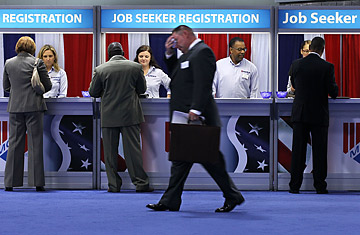
A job seeker passes by the registration booths during a career fair at the Walter E. Washington Convention Center September 27, 2011 in Washington, DC.
(3 of 3)
We know the story since then. There has been no bounce back. Each year, as temporary stimulus measures have worn off, Obama has called for another sharp, short push. This was the message at the end of 2010 when the White House and Congress agreed to extend the George W. Bush--era tax cuts to 2012 and when the White House received a temporary cut in payroll taxes. This is the message again today. The new American Jobs Act calls for more tax cuts and temporary outlays. But there are few takers for "just one more year" of stimulus when the results of the first three years have been so poor.
The Republican approach has boiled down to one idea: cut taxes permanently to revive the economy, and slash government spending to end the need for taxation. It's an argument that they've peddled, and largely implemented, for 30 years, with poor and worsening results. They claim, without evidence, that taxes and regulations are killing job creation, though many countries with much higher taxes and much stiffer corporate regulations have much higher employment rates than the U.S. The Republicans fail to understand that businesses are investing abroad not because of taxes but because higher wages in the U.S. are not sufficiently matched by higher skills, as they are in, say, Germany or Sweden. We are, to put it bluntly, simply uncompetitive in many industrial sectors.
The truth is that it will take more spending--not in the form of haphazard stimulus but in smart long-term public investments in education, infrastructure and human capital--to get us out of our present mess. We will keep our high living standards only if we embrace and manage the complexities of a technologically advanced and globalized economy.
It's time to stop arguing about spending cuts for everyone and tax cuts for the rich. Instead, Congress should be having a serious discussion about how we're going to fund our future competitiveness. In this way, we can build the skills and productivity in our society to compete effectively in the 21st century. If we do what needs to be done, we will look back at the decades from the 1980s till now as merely a detour from reform, a period when America lost track of the realities of a fast-changing world economy and our need to change with it. It's heartening to know that the young in America remain optimistic about the potential of government to solve problems. They are energized for a fresh start.
Sachs, author of the new book The Price of Civilization, is director of Columbia University's Earth Institute and a special adviser to the U.N. Secretary-General
